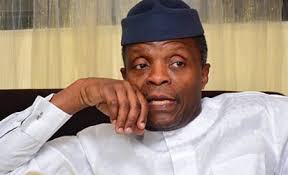Vice President Yemi Osinbajo has said that it is inevitable for Nigerians to pay more for electricity consumed.
Osinabjo on Monday at the Sixth Presidential Business Forum held at the Banquet Hall of the Presidential Villa, Abuja, said “Listening to questions concerning lower tariffs, we must pay higher tariffs, these sorts of things are inevitable.”
The last time the issue of electricity tariff was raised in 2016, the Senate directed the Nigerian Electricity Regulatory Commission (NERC) to suspend the tariff hikes immediately.
The vice-president through a statement by his media aide, Laolu Akande, said that the government is trying not to increase electricity tariff immediately.
“What we are trying to do is not increase tariffs for now, but how we can ensure we clean up the entire value chain. I’m sure you are aware of the Payment Assurance Guarantee (PAG), which we put in place for over N700 billion to ensure gas is paid for and for liquidity in the whole value chain.
“Today, we will be meeting with the World Bank on a scheme they have been working with us on to fund the entire value chain, and ensure we transit smoothly from where we are, to a much more market-determined policy for electricity. This will involve a fair amount of subsidy and help; the Federal Government and World Bank are working together on that. There is no way of sustaining the current subsidies long term, but we want to ensure the process is smooth.”
This is really a course for concern for Nigerians since they cannot boast of uninterrupted power supply for 24hours. In Lagos state alone the power situation is in a terrible state. People pay so much for less, there are no prepaid meters available to be distributed and the Power Holding Company of Nigeria (PHCN) officials bring crazy bills without reading meters. Imagine travelling out of the country for three months only for you to return and find out that power has been disconnected from your house but yet you have to pay for the light that you didn’t use.
The questions that beg to be answered are, should the government be talking about increasing electricity tariffs at a period when the country is coming out of recession? Should they not focus on providing solutions to the present problems which consumers face, such as crazy billing and a lack of access to electricity and prepaid meters, rather than increasing electricity tariffs?














